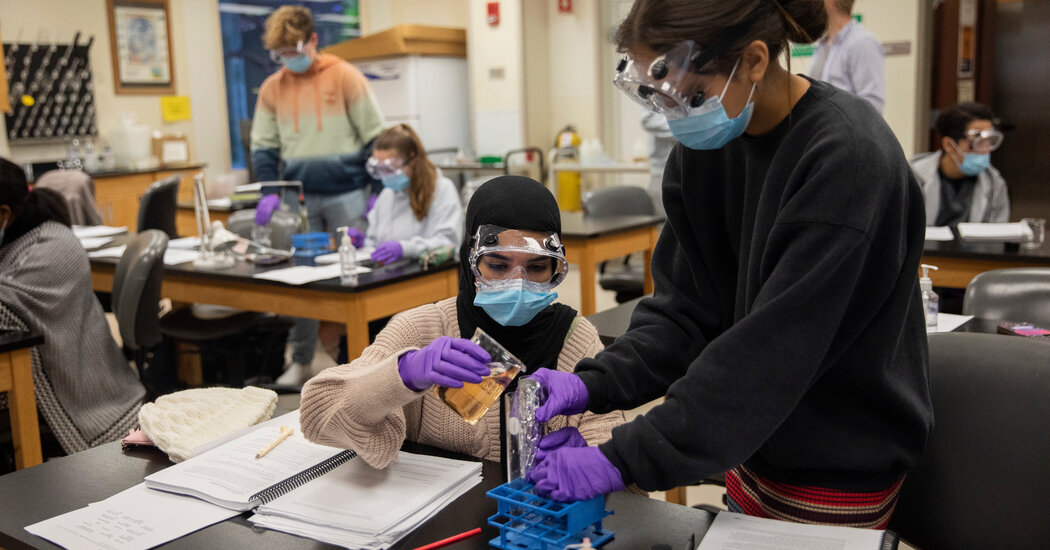
President Speaks: Pandemic Taught Colleges to Better Support Single Mothers
President speaks the pandemic taught colleges how to better support students who are single mothers – President Speaks: Pandemic Taught Colleges to Better Support Students Who Are Single Mothers. This statement reflects a growing awareness of the unique challenges faced by single mothers in higher education, particularly during the COVID-19 pandemic. The pandemic, with its disruptions to childcare, access to technology, and financial stability, exposed the pre-existing barriers single mothers encounter in pursuing higher education.
This led to a critical examination of how colleges could better support these students and ensure their success.
The pandemic forced colleges to re-evaluate their approaches and implement innovative solutions. Flexible learning options, expanded childcare support programs, and enhanced financial aid initiatives emerged as key strategies to address the needs of single mothers. The success of these changes in supporting single mothers’ academic progress is a testament to the adaptability and commitment of higher education institutions to create a more inclusive and supportive learning environment.
The Impact of the Pandemic on Single Mothers in Higher Education

The COVID-19 pandemic presented unprecedented challenges for all students, but single mothers faced a unique set of obstacles that exacerbated existing barriers to higher education. The pandemic’s disruption of childcare, access to technology, and financial stability disproportionately impacted single mothers, pushing many to the brink of academic withdrawal.
Disruption of Childcare
The pandemic’s impact on childcare was particularly devastating for single mothers. School closures and social distancing guidelines forced many single mothers to juggle their studies with childcare responsibilities. This added stress and strain often made it difficult for single mothers to focus on their academic work.
The pandemic also highlighted the existing childcare affordability crisis, with many single mothers facing the difficult choice between paying for childcare or paying for tuition.
Limited Access to Technology
The shift to online learning during the pandemic exacerbated existing digital divides, particularly for single mothers. Many single mothers lacked access to reliable internet or personal computers, making it challenging to participate in online classes and complete assignments. The lack of access to technology also made it difficult for single mothers to connect with professors and classmates, hindering their ability to receive academic support and build a sense of community.
Financial Instability
The pandemic’s economic fallout disproportionately affected single mothers, who are more likely to work in low-wage jobs and lack access to financial resources. Job losses, reduced work hours, and increased childcare costs left many single mothers struggling to make ends meet.
This financial instability made it difficult for single mothers to afford tuition, books, and other educational expenses, forcing many to consider dropping out of school.
Adapting to the Needs of Single Mothers

The COVID-19 pandemic presented unprecedented challenges for single mothers in higher education, highlighting the need for institutions to adapt and provide greater support. Colleges and universities responded by implementing a range of initiatives designed to address the unique needs of this population.
Flexible Learning Options
The pandemic forced many institutions to shift to online and hybrid learning models, which proved to be a valuable resource for single mothers. This flexibility allowed students to balance their academic responsibilities with childcare and other family obligations.
- Increased Accessibility:Online courses offered greater flexibility in terms of time and location, enabling single mothers to study at their own pace and on their own schedule. This was particularly helpful for students with limited access to childcare or who had to juggle work responsibilities.
- Reduced Transportation Costs:Online learning significantly reduced the need for transportation, which can be a major expense for single mothers. This freed up time and resources that could be allocated to other essential needs.
- Enhanced Learning Environments:For some students, the online learning environment provided a more comfortable and conducive learning environment, minimizing distractions and allowing them to focus better.
Childcare Support Programs
Recognizing the significant challenges posed by childcare, many colleges and universities implemented programs to assist single mothers.
The president’s speech highlighting how the pandemic forced colleges to adapt and better support single mothers is a powerful reminder of the importance of empathy and innovation in leadership. These are just two of the ten crucial leadership skills needed in today’s workplace, as outlined in this excellent article 10 most important leadership skills for the 21st century workplace and how to develop them.
By embracing these skills, we can create a more supportive and adaptable environment for all students, particularly those facing unique challenges like single motherhood.
- On-Campus Childcare Centers:Some institutions expanded or created on-campus childcare centers, providing affordable and accessible childcare options for students. These centers often offered flexible hours to accommodate class schedules.
- Childcare Subsidies:Several colleges and universities introduced financial assistance programs to help single mothers cover childcare expenses. These subsidies could be used for a variety of childcare arrangements, including in-home care, daycare centers, and after-school programs.
- Partnerships with Local Childcare Providers:Some institutions established partnerships with local childcare providers to offer discounted rates or priority access to students. This approach provided a wider range of childcare options and ensured greater flexibility.
Financial Aid Initiatives
The pandemic also highlighted the need for greater financial support for single mothers in higher education. Colleges and universities responded by expanding and enhancing their financial aid programs.
- Emergency Grants and Scholarships:Many institutions created emergency grant programs to provide immediate financial assistance to students facing unexpected financial hardships. These grants could cover expenses such as rent, utilities, food, and childcare.
- Increased Pell Grant Eligibility:The federal government expanded Pell Grant eligibility criteria to include more single mothers, making higher education more affordable for this population. This increase in financial aid allowed students to focus on their studies without worrying about the burden of tuition and other expenses.
- Work-Study Programs:Some colleges and universities expanded their work-study programs to provide students with part-time employment opportunities on campus. These programs allowed single mothers to earn income while pursuing their education, reducing financial stress and contributing to their academic success.
Lessons Learned and Future Directions: President Speaks The Pandemic Taught Colleges How To Better Support Students Who Are Single Mothers

The pandemic forced colleges to adapt quickly, and the changes implemented to support single mothers have yielded valuable insights. These lessons can inform the development of more robust and effective support systems for single mothers in higher education.
The Long-Term Impact of Pandemic-Driven Changes
The pandemic’s impact on single mothers in college has revealed the need for more flexible and accessible support services. The shift to online learning and remote work has highlighted the importance of flexible scheduling and access to childcare. The increased availability of emergency aid and mental health resources has also proven crucial.
These changes have the potential to transform the way colleges support single mothers in the long term.
It’s great to see the president acknowledging the challenges faced by single mothers in higher education, and the pandemic really did force colleges to become more adaptable and supportive. It’s a step in the right direction, but it also makes me wonder – will the pro-abortion rights billionaires please stand up and offer tangible support to these mothers?
Maybe they could fund scholarships, childcare centers, or even just awareness campaigns about the resources available to single mothers. After all, empowering these women to thrive is an investment in our future.
The Potential for Continued Support, President speaks the pandemic taught colleges how to better support students who are single mothers
Many of the pandemic-driven changes, like expanded online course offerings, virtual support groups, and increased access to emergency funds, have proven to be beneficial and cost-effective. Colleges should consider making these supports permanent features of their support systems. This would ensure that single mothers continue to have access to the resources they need to succeed in their academic pursuits.
The president’s recent speech about how the pandemic forced colleges to adapt and better support single mothers is a welcome development, but it’s hard to celebrate when you read stories like the one about the Columbia graduate student brutally beaten in Manhattan, leaving her mother struggling for answers.
It’s a stark reminder that the challenges facing single mothers in higher education are complex and often go beyond access to resources. We need more than just words – we need real action and a commitment to ensuring safety and support for all students, especially those facing additional burdens.
A Roadmap for Enhanced Support
Based on the lessons learned during the pandemic, colleges can further enhance their support systems for single mothers by focusing on the following key areas:
- Expanding Access to Flexible Learning Options:Colleges should continue to offer a wider range of online and hybrid courses, allowing single mothers to balance their studies with their parenting responsibilities. This includes providing access to childcare services during online classes or study sessions.
- Providing Comprehensive Financial Aid:Colleges should expand financial aid packages to cover childcare expenses, transportation costs, and other unexpected expenses. This could include scholarships specifically designed for single mothers, as well as emergency grants to help them overcome unforeseen financial challenges.
- Creating a Supportive Campus Environment:Colleges should foster a welcoming and supportive campus environment for single mothers. This could include creating designated spaces for breastfeeding and pumping, offering peer support groups, and connecting single mothers with mentors and resources.
- Developing Partnerships with Community Organizations:Colleges should collaborate with local organizations that provide childcare, housing, and other essential services to single mothers. These partnerships can help ensure that single mothers have access to a comprehensive network of support.
Impact on Student Success and Retention
The pandemic’s disruptions significantly impacted single mothers in higher education, but the changes implemented to support them have demonstrably improved their academic success and retention rates. These improvements are a testament to the effectiveness of tailored support services and highlight the critical role they play in fostering a more inclusive and supportive learning environment for single mothers.
The Correlation Between Support Services and Student Outcomes
A robust body of research underscores the positive correlation between the availability of support services and improved student outcomes for single mothers. Studies have consistently shown that access to childcare, financial aid, academic advising, and mental health resources can significantly enhance academic performance, reduce stress levels, and ultimately increase the likelihood of graduation.
For instance, a study published in the Journal of Higher Education found that single mothers who received comprehensive support services were more likely to achieve higher GPAs, persist in their programs, and graduate on time compared to their counterparts who lacked access to such resources.
Success Stories of Single Mothers
The impact of these changes can be seen in the success stories of single mothers who have thrived in their academic pursuits thanks to the support provided during the pandemic.
“Before the pandemic, I struggled to balance my studies with my childcare responsibilities. But when the university implemented online learning and provided access to on-campus childcare, it made a world of difference. I was able to focus on my studies and excel in my classes. Now, I am on track to graduate and pursue my dream career.”
Sarah, a single mother and college student.
Another compelling example is that of Jessica, a single mother who was facing financial hardship due to the pandemic. Thanks to the university’s emergency financial aid program, she was able to cover her tuition and living expenses, allowing her to continue her studies without interruption.
Jessica’s story exemplifies the transformative power of financial aid in empowering single mothers to overcome financial barriers and achieve their educational goals.
Last Point
The pandemic has taught colleges valuable lessons about the importance of providing comprehensive support systems for single mothers. These lessons, coupled with the data demonstrating the positive impact of these changes on student success and retention, point towards a future where colleges prioritize the needs of single mothers and create a more equitable pathway to higher education for all.






